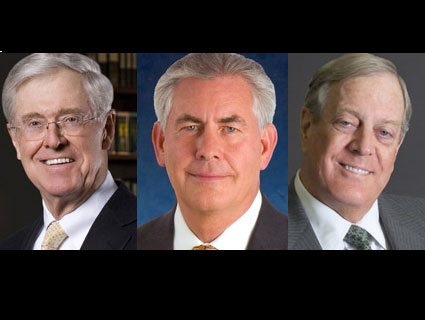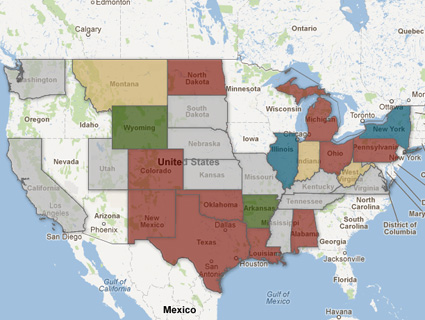
 David Lesar, Halliburton: Halliburton launched the first US commercial fracking operation in 1949. At a 2011 conference, CEO Lesar asked his CFO to demonstrate the safety of the company’s CleanStim fracking fluid by taking a sip of it. The exec reported that it “tastes like beer.”
David Lesar, Halliburton: Halliburton launched the first US commercial fracking operation in 1949. At a 2011 conference, CEO Lesar asked his CFO to demonstrate the safety of the company’s CleanStim fracking fluid by taking a sip of it. The exec reported that it “tastes like beer.”
 Rex Tillerson, ExxonMobil: Since 2006, Tillerson has been CEO of the nation’s top natural gas producer. Fracking concerns, he says, are hyped by “lazy” journalists and groups that “manufacture fear,” and one of his company’s challenges is educating “an illiterate public” about fracking.
Rex Tillerson, ExxonMobil: Since 2006, Tillerson has been CEO of the nation’s top natural gas producer. Fracking concerns, he says, are hyped by “lazy” journalists and groups that “manufacture fear,” and one of his company’s challenges is educating “an illiterate public” about fracking.
 Aubrey McClendon, Chesapeake Energy: Cofounder of the Marcellus Shale’s biggest player, McClendon calls fracking critics “modern day Luddites” who dream of “some fantasy world of no fossil fuels.” He’s reportedly worth $1.1 billion, but a weak economy led him to sell most of his 100,000 bottles of wine.
Aubrey McClendon, Chesapeake Energy: Cofounder of the Marcellus Shale’s biggest player, McClendon calls fracking critics “modern day Luddites” who dream of “some fantasy world of no fossil fuels.” He’s reportedly worth $1.1 billion, but a weak economy led him to sell most of his 100,000 bottles of wine.
 Charles and David Koch, Koch Industries: The brothers, worth around $25 billion each, have bankrolled energy industry front groups and raised millions to help defeat President Obama. Koch Industries and its subsidiaries (PDF) transport and trade oil from fracking operations and produce chemicals used in fracking.
Charles and David Koch, Koch Industries: The brothers, worth around $25 billion each, have bankrolled energy industry front groups and raised millions to help defeat President Obama. Koch Industries and its subsidiaries (PDF) transport and trade oil from fracking operations and produce chemicals used in fracking.
 Trevor Rees-Jones, Chief Oil: Rees-Jones has made billions fracking for natural gas in Texas and Pennsylvania. He emerged as a key GOP funder in 2008 and has since given $1.2 million to outside-spending groups, including Karl Rove’s American Crossroads super-PAC.
Trevor Rees-Jones, Chief Oil: Rees-Jones has made billions fracking for natural gas in Texas and Pennsylvania. He emerged as a key GOP funder in 2008 and has since given $1.2 million to outside-spending groups, including Karl Rove’s American Crossroads super-PAC.
 Bob Dudley, BP: Dudley replaced CEO Tony Hayward (who presumably got his “life back”) five months after the Gulf fiasco. Fracking is “not that complicated,” he says. “But it sure has a bad reputation.”
Bob Dudley, BP: Dudley replaced CEO Tony Hayward (who presumably got his “life back”) five months after the Gulf fiasco. Fracking is “not that complicated,” he says. “But it sure has a bad reputation.”
 John Watson, Chevron: In May, CEO Watson said there are “legitimate concerns” about fracking, yet the gas boom is “a once-in-a-generation benefit” that should be reaped “with the proper precautions.”
John Watson, Chevron: In May, CEO Watson said there are “legitimate concerns” about fracking, yet the gas boom is “a once-in-a-generation benefit” that should be reaped “with the proper precautions.”
 James Hackett, Anadarko: Hackett, Anadarko’s chairman, has said frackers should fight “these very strident forces” aiming to “basically take us back to the Stone Age.”
James Hackett, Anadarko: Hackett, Anadarko’s chairman, has said frackers should fight “these very strident forces” aiming to “basically take us back to the Stone Age.”














